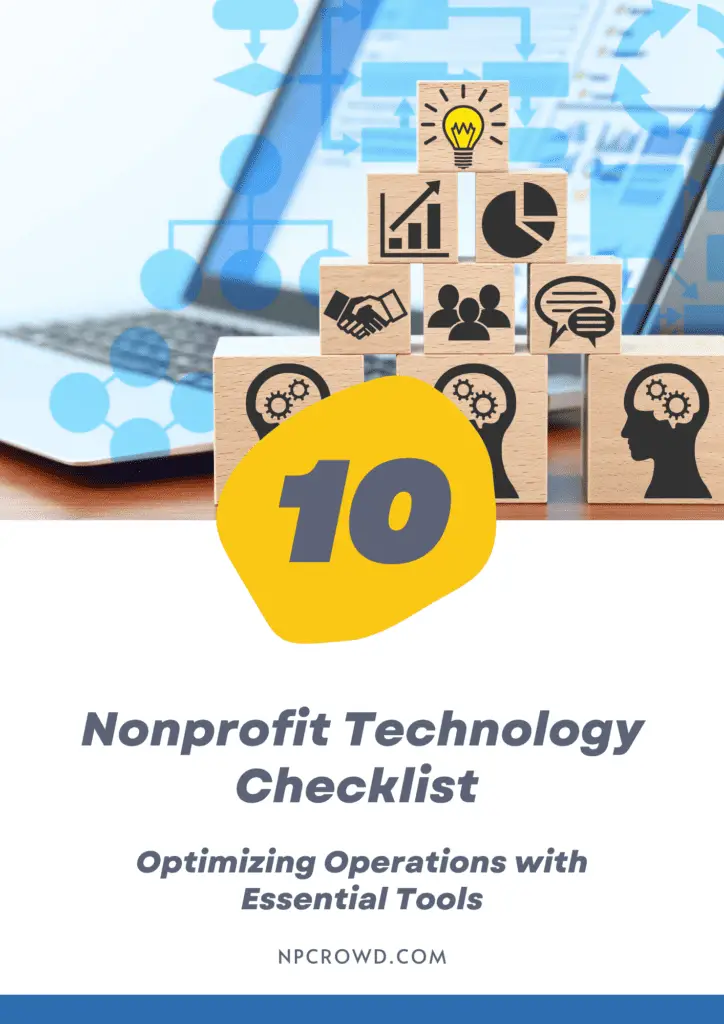11 Reasons Why You Should NOT Work for a Nonprofit
Disclaimer: This post may contain affiliate links. These links, if used and purchases made, we may earn a small commission. These affiliate programs do not impact the recommendations we make or the resources we refer you to. Our focus is on providing you the best resources for your nonprofit journey.
Working for a nonprofit is not always easy. Nonprofits typically have little money to pay their employees, and they often do not reward high performers with promotions or higher salaries. As if that wasn’t bad enough, the work can be stressful because of time constraints and the need to do many jobs at once.It may sound like a fun idea but working for a nonprofit has its disadvantages as well as advantages. In this article, we will give you 11 reasons why you should NOT work for a nonprofit!
To round out the discussion, be sure to read our 9 reasons why you will want to work for a nonprofit.
1. Nonprofits are not as stable or lucrative as private companies
A nonprofit job is not always a stable job. Nonprofits are typically in danger of closing, which may mean the loss of your income and benefits.
Private companies or governments typically offer more stability for their employees because they can continue generating revenue even if one area has a downturn. Most nonprofits rely on donations to cover all expenses and so fluctuations in the market may result in budget shortfalls when donations are unavailable.
Nonprofit organizations often have less than 20 staff members so you will never make it up into management at a large-scale organization with no layoffs or downsizing opportunities available like those found in larger private company structures.
You also may not get perks like 401k matching programs that are offered by most corporations as well as tax breaks on some stock purchases – all things that help ensure workers’ financial well-being.
2. Can you get paid what you’re worth
In many cases, nonprofits may not be able to offer competitive salaries. This is because they are responsible for keeping their doors open and service running no matter what the cost to make sure people in need continue being helped.
Nonprofits typically operate on tight budgets so this will mean less money available for employees or lower wages altogether. You can see how quickly a nonprofit could spiral out of solvency if it has too many administrative costs or spending more than its revenues generated by donations.
Even if they can, many nonprofits make a conscious choice to be 3-10% below market in salaries in order to ensure the missional connection is first and foremost.
How do you feel about that? There is a mix of opinions, even from leaders and staff who already work in the nonprofit space. As many Simon Sinek fans might already know, understanding your “Why?” is important
3. You may have to work long hours for lower pay
When working for a company, you may have the option to set your own hours. Your workload is largely up to you and what feels manageable while still meeting expectations and producing agreed-upon results. However, when it comes to working as an employee at a nonprofit organization this isn’t always true.
The requirements of people in need often dictate how many hours are needed by those who work there – so if they’re open during non-business hours or on weekends because families need them then that’s where you’ll be too.
Some nonprofits might ask their employees not to take any time off even during holidays like Christmas Day or Thanksgiving since these events can mean more people coming in seeking help due to financial hardships from things like low income paychecks all year round, layoffs, etc. You also might not be able to take a vacation at all.
Nonprofits are often understaffed so if the person you’re working alongside with is out for any reason, then it’s up to you to work extra hours or cover their tasks as they would have done them otherwise. This may also mean that there will be times where you’ll need to put in split shifts and go from one job site immediately to another without taking much of a break in-between even on days off (or weeks).
Come to think of it, this may be different than some companies but about the same type of work environment as others.
4. The culture is often less competitive and cutthroat than in a corporate environment
Nonprofits often have a more relaxed culture than corporate environments. There is less competition and cutthroat behavior which can make for an easy-going environment where the focus is on teamwork rather than individual advancement or achievement.
The culture in a nonprofit organization will be different from a typical, competitive corporate environment. Nonprofits are usually focused on teamwork over individual success so it’s not as intense with people fighting to get ahead of one another.
The downside of this kind of atmosphere is that there may be fewer opportunities for professional development because individuals are expected to wear many hats instead of specializing in their area like they would at other organizations. This means you won’t really be able to grow into your job and will not be able to move up the corporate ladder.
Nonprofits typically pay less than for-profit organizations, so if you’re looking for a high-paying job, this isn’t it. You’ll also need to take into account that some nonprofits are doing more work with fewer people which can lead to cutthroat behavior and inefficient processes since everyone has their hands full! If you think about these things before accepting an offer at a nonprofit organization then you might find it much easier when making your decision.
In addition, because of the lower salaries available in non-profit sectors, there is evidence that many hire staff below market rates or do not provide competitive benefits such as retirement plans and health care insurance.
5. Promotions are limited, especially if you’re working at a small nonprofit
When you are working at a small nonprofit and don’t have the qualifications or experience for more senior positions, it can be hard to get promoted into mid-level positions.
With so much on your plate already with day-to-day tasks like fundraising and managing projects, there’s little to no room left in your schedule for additional opportunities that come with increased responsibility.
Not only that, funds may be limited and therefore a position may be needed in an organization, but funding prevents the Executive Director from being able to create the role. This means, you’re stuck longer in your role even when you are capable of more and the organization needs it.
If you want to advance your career, working for a non-profit can be a limiting factor. According to one reader, “In my experience in executive levels roles in two different nonprofits in the last twelve years, I found it difficult to prioritize new opportunities because there were always so many other things on my plate – fundraising and managing projects was never-ending!”
In addition, if someone is not interested in doing something forever then they may feel like this work environment does not provide them with an opportunity for advancement or growth within their desired field. Working at a nonprofit organization is often considered “the first step” into one’s profession but that doesn’t make it comfortable when you’re struggling just to meet deadlines every day.
6. Fewer professional development and career advancement opportunities
We hinted at this above. Working for a nonprofit organization means that someone is likely to stay in the same position until they are ready to retire or leave. That’s not always what people want and it may affect their willingness to take on this type of work and commitment.
Given tight budgets, dollars designated for professional development are few. This means that the opportunities for professional development are few and far between.
There is less opportunity to grow your skillset or even change jobs inside a nonprofit organization because it’s often an all-or-nothing environment in terms of responsibilities. If someone wants to take on more responsibility, they may need to switch organizations which can be difficult if there aren’t many options locally.
Finally, executives in a nonprofit may be lacking experience and training in leadership development. This means that intentional leadership development plans are few and far between.
7. Lack of professional networking opportunities
Nonprofits are often smaller and don’t have the opportunity to bring in external speakers or host events at a frequency that larger organizations can. This limits opportunities for professional networking, which could be very beneficial.
Annual meetings serve as an exception; but if you’re looking to meet with professionals regularly, this might not work well for you.
Networking is important because it helps us keep up-to-date on news trends and changes within the industry, find mentors who will guide our career paths, make connections with others in similar fields so we learn from them, and bounce ideas off each other without feeling like we’re competing against one another, etc. It’s also valuable when it comes time to look for a new job!
It’s up to you to grow your career on your own time.
8. Slow-moving & bureaucratic organizations
Nonprofits can be slow-moving, bureaucratic organizations that don’t always make good use of your skillset or offer challenging projects/tasks to complete.
One reason could be the bureaucracy within the organization for approvals and other types of processes. There is also a greater chance you may not have enough staff in specific areas (such as virtual assistants or designers) and will need to work with others who may not be as skilled.
Sometimes the founder does not have the business education or experience to lead an organization while still being passionate about a cause. This can cause re-work, lack of direction, and a lack of accountability and/or trust. This will slow the growth of a nonprofit.
It will be up to you to push things forward. You may also find that there is a lack of understanding in specific areas and it will be up to you to learn about them to help move the organization along to action.
9. Delayed gratification of your efforts
When working in a nonprofit, the services you help make possible may not immediately show a positive impact in the lives of your clients. In fact, it may take a while for you to see any tangible results from your hard work and dedication.
A worker in a nonprofit may not feel properly appreciated for their work and can be undervalued by the organization they are working with. It will also take time for those within the company to see any tangible results from your hard work, so it’s important that you’re patient if this is something you worry about.
Finally, there might not always be enough people who understand how things should get done – it would most likely fall on you to teach others what needs doing and show them how best to do it for maximum impact!
10. High turnover rates
The non-profit sector has high turnover rates according to a study conducted by Gallup in 2011 which stated that at least one-third of employees (33%) voluntarily leave nonprofit organizations every year (in other sectors less than 20% leave).
Nonprofit turnover rates are being driven by young people who want to work on personally meaningful projects and feel they have a more fulfilling career elsewhere.
People may not enjoy the smaller industry since it is often difficult for nonprofits to attract top talent, due in part to lower salaries than other industries.
Additionally, there might be less opportunity for upward mobility which can lead some people away from working at nonprofit organizations. The sector has also been criticized as disorganized with unclear guidelines that make it hard for employees or volunteers to know what their job responsibilities are and how best they should complete them – this contributes to burnout among workers.
In addition, many of these non-profits operate without an established organizational strategy and planning process which results in wasted time and money.
An impact of high turnover in nonprofits is that it may take longer than expected to find a job after being laid off from one position due to budget cuts or organizational restructuring.
11. It’s a Cause, not a Company?
Working for a nonprofit is about having a positive social impact on a cause rather than the for-profit bottom line of revenue. This can be beneficial to many people, but not all. For those that are more motivated by success and money than a feeling of making an impact in the world, working for a non-profit may be less appealing.
In fact, nonprofits are corporate entities and do have a need to bring in revenue that covers their expenses. Thinking otherwise is a nonprofit myth and leads to the failure of many new nonprofits.
Conclusion
In conclusion, non-profit jobs can be a fulfilling experience for many people. However, some may not want to work in this field because they are motivated by other things or value the security of having a regular, larger, paycheck.
There are also organizational challenges that may make it difficult for an individual who is more task-oriented rather than relationship-focused to thrive at their job due to high turnover rates and fewer organization skills required depending on the size of the company as opposed to large corporate companies with lots of resources available.
If you are looking to join or recruit for a nonprofit, we have a list of nonprofit job boards that are effective and helpful here.



![3 Meta Nonprofit Organizational Structures: A Comparison 25 3 Meta Nonprofit Organizational Structures [Comparison]](https://npcrowd.com/wp-content/uploads/2021/11/3-Meta-Nonprofit-Organizational-Structures-Comparison-768x402.png)



